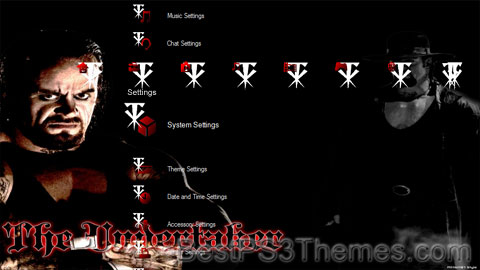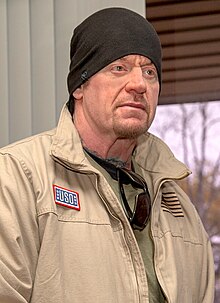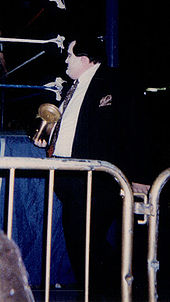The Undertaker theme by Superbeast
Download: TheUndertaker.p3t

(3 backgrounds)
| The Undertaker | |||||||
|---|---|---|---|---|---|---|---|
 Calaway in 2019 | |||||||
| Birth name | Mark William Calaway | ||||||
| Born | March 24, 1965 Houston, Texas, U.S. | ||||||
| Spouse(s) |
| ||||||
| Children | 5 | ||||||
| Professional wrestling career | |||||||
| Ring name(s) | |||||||
| Billed height | 6 ft 10 in (208 cm)[5] | ||||||
| Billed weight | 309 lb (140 kg)[5] | ||||||
| Billed from | Death Valley[5] Houston, Texas | ||||||
| Trained by | Buzz Sawyer[6][7] Rick Davidson John Davidson | ||||||
| Debut | June 26, 1987[4][8] | ||||||
| Retired | November 22, 2020[a] | ||||||
YouTube information | |||||||
| Channel | |||||||
| Years active | 2023–present | ||||||
| Genre | Professional wrestling | ||||||
| Subscribers | 427 thousand[12] | ||||||
| Total views | 75.29 million[12] | ||||||
| |||||||
Last updated: June 24, 2024 | |||||||
Mark William Calaway (born March 24, 1965), better known by his ring name The Undertaker, is an American retired professional wrestler. Widely regarded as one of the greatest professional wrestlers of all time,[13] Calaway spent the vast majority of his career wrestling for WWE and in 2022 was inducted into the WWE Hall of Fame.[14]
Calaway began his career in 1987, working under various gimmicks for World Class Championship Wrestling (WCCW) and other affiliate promotions. He signed with World Championship Wrestling (WCW) in 1989 for a brief stint, and then he joined the World Wrestling Federation (WWF, turned WWE) in 1990.
Calaway was rebranded as "The Undertaker" on joining the WWF. As one of WWE's most high-profile and enduring characters,[15][16] The Undertaker is famed for his undead, funereal, macabre "Deadman" persona, which gained significant mainstream popularity and won him the Wrestling Observer Newsletter award for Best Gimmick a record-setting 5 years in a row.[17] He is the longest-tenured wrestler in company history at 30 years. In 2000, the Undertaker adopted a biker identity nicknamed "American Badass". Calaway resurrected the Deadman Undertaker in 2004, with residual elements of the "American Badass" remaining.
For the better part of his career, the Undertaker was observed as a focal point of WWE's flagship annual event, WrestleMania, where he became esteemed for The Streak — a series of 21 straight victories. He is also known for pairing with his in-storyline half-brother Kane, with whom he had alternatively feuded and teamed (as the Brothers of Destruction) from 1997 through 2020. During his wrestling career under the Undertaker gimmick, Calaway won the WWF/E Championship four times, the World Heavyweight Championship three times, the Hardcore Championship once and the World Tag Team Championship six times. He also won the Royal Rumble match in 2007.
Early life[edit]
Mark William Calaway was born in Houston, Texas, on March 24, 1965,[18][19][20] the son of Frank Compton Calaway (died July 2003) and Betty Catherine Truby.[citation needed] He has four older brothers named David, Michael, Paul, and Timothy (died March 2020, age 63).[21] He attended Waltrip High School, where he was a member of the football and basketball teams. He graduated in 1983 and began studying on a basketball scholarship at Angelina College in Lufkin, Texas. In 1985, he enrolled in Texas Wesleyan University in Fort Worth, Texas, where he majored in sport management and played as a center for the Rams in the 1985–1986 season. In 1986, Calaway dropped out of university to focus on a career in sports and briefly considered playing professional basketball in Europe, before deciding to focus on professional wrestling.[22][23][24][25]
Professional wrestling career[edit]
Early career (1987–1989)[edit]
Calaway began training under Buzz Sawyer in late 1986;[6][26] he disliked Sawyer, who reportedly lacked commitment and provided a limited education.[6][7] Calaway learned "on the job" thereafter.[27] Performing under a mask as Texas Red,[7] Calaway wrestled his first match on June 26, 1987, for World Class Championship Wrestling (WCCW), losing to Bruiser Brody at the Dallas Sportatorium.[8][28] He was accompanied to the ring by Percival "Percy" Pringle III, who would later serve as his manager in the WWF as Paul Bearer.[7][29] Two myths have circulated regarding Calaway's beginnings in the industry, the first being that he made his in-ring debut in 1984,[6] and the second being that he was trained by former WCCW colleague Don Jardine (aka The Spoiler).[30][31] While never trained by Jardine, Calaway was an admirer of his work and would emulate Jardine's top rope walk.[32][33] PWInsider's Mike Johnson stated, "Undertaker using some of Jardine's style eventually morphed into this story that he was trained by Jardine."[27]
He wrestled in Durban, South Africa on August 22, 1987, as "Texas Red Jack", losing to Tiger Singh.[34] He would also wrestle in prison shows under the name Boris Dragu, a Russian grave digger.[2]
In 1988, Calaway developed a military gimmick named The Commando. Under this persona, he mainly wrestled in the Chicago area for Central Illinois Wrestling. He would also have a brief stint in Georgia for Southern Championship Wrestling.
By the end of 1988, Calaway joined the Continental Wrestling Association, wrestling under several gimmicks. On February 2, 1989, managed by Dutch Mantel, he was reintroduced as The Master of Pain, a former murderer.[35] On April 1, The Master of Pain won his first professional wrestling championship by defeating Jerry Lawler for the USWA Unified World Heavyweight Champion. Just over three weeks had passed when Lawler became the first man to pin him, giving it back to him. While performing as The Punisher upon returning to Dallas, Calaway won the USWA Texas Heavyweight Championship on October 5, 1989, when Eric Embry forfeited the title.[36]
World Championship Wrestling (1989–1990)[edit]
By the end of 1989, Calaway joined World Championship Wrestling (WCW) as a villain and adopted the ring name "Mean Mark" Callous, a name devised for him by Terry Funk.[37] He was portrayed as a sinister force, wearing predominantly black ring attire and was described by commentator Jim Ross as having a fondness for pet snakes and the music of Ozzy Osbourne.[38] Callous was promptly drafted into The Skyscrapers tag team to replace a legitimately injured Sid Vicious, and made his debut on January 3, 1990, in a match later televised against Agent Steel and Randy Harris.[39] The new team gained some notoriety at Clash of the Champions X when they beat down The Road Warriors after their match.[40] However, Callous's partner Dan Spivey left WCW days before their Chicago Street Fight against the Road Warriors at WrestleWar. Callous and a replacement masked Skyscraper were defeated in the street fight and the team broke up soon afterwards.[41] Now a singles wrestler, Callous took on the guidance of Paul E. Dangerously (Paul Heyman).
Calaway later began to question his future in WCW after being told by company booker, Ole Anderson, during contract renewal discussions that nobody would ever pay money to watch him perform.[6] It was in response to this that Calaway made numerous efforts to join the World Wrestling Federation, going to many lengths to land a meeting with Vince McMahon. However, accessing and securing an interview with McMahon was described by Calaway as a despairing task.[42]
Among routes Calaway took to land a meeting with McMahon was trying to convince individuals acquainted with McMahon or already existing WWF talent to recommend him into the WWF, such as Hulk Hogan, Paul Heyman, and Bruce Prichard, crediting the latter two for arranging the meeting at McMahon's mansion.[43]
Calaway immediately gave notice to WCW before the interview took place. McMahon initially declined to hire Calaway; however, several days later the owner pitched the idea an "Old West Undertaker," a concept he had intended to create for several years but had never found an appropriate wrestler to play the part.[43]
Calaway's final WCW match was on September 7 at a WorldWide taping in Amarillo, Texas in which he defeated Dave Johnson.[39] During his time in WCW, Calaway briefly wrestled in New Japan Pro-Wrestling (NJPW) as "Punisher" Dice Morgan.[44] After leaving WCW, he briefly returned to the USWA to participate in a tournament to determine the new USWA Unified World Heavyweight Champion; Calaway defeated Bill Dundee in the first round, but lost to Jerry Lawler in the quarterfinals.
World Wrestling Federation/Entertainment/WWE[edit]
Debut of The Undertaker (1990–1991)[edit]
In October 1990, Calaway signed with the World Wrestling Federation (WWF), set to portray the "brainchild" of McMahon that he had assigned to him, originally entitled Kane the Undertaker[43] ("Kane" later added on to "the Undertaker" moniker by the time of his arrival at the urgings of Bruce Prichard, who had always desired a Cain and Abel effect for his character).[45] Despite Calaway's perplexed, pessimistic feelings about McMahon's gimmick idea, he was readily accepting of the role, feeling anything better than the laughingstock gimmicks of that time, such as The Gobbledy Gooker.[42][46][43] Kane the Undertaker was characterized as a menacing derivative of the Wild West undertakers depicted in television westerns. Resulting from that, this first edition of the Undertaker's series of Deadman incarnations[42][46] has been distinguished in external media as "The Old West Mortician".[47][48] He made his overall WWF debut on a November 19, 1990, taping of WWF Superstars quickly defeating his first opponent, Mario Mancini, in a singles match[49] (this match was filmed three days prior to the Undertaker's televised debut at the November 22 Survivor Series, but did not air on television until December 15, 1990). Also prior to his Survivor Series appearance, Kane the Undertaker had a match on November 20 against Rick Sampson, which later aired on the December 9, 1990 episode of WWF Wrestling Challenge.[50]
Calaway's official televised debut was the Survivor Series event in which he was presented as the heel mystery partner of Ted DiBiase's "Million Dollar Team".[51] Approximately one minute into the match, the Undertaker eliminated Koko B. Ware with his finisher, the Tombstone Piledriver.[52] (In 2018, Koko B. Ware shared that directly following this match that night, he confronted the Undertaker with serious objections to what he felt was a botched Tombstone. Though Ware also shared that he always admired Mark Calaway and perceived him as a great performer).[53] During the match, the Undertaker also eliminated Dusty Rhodes before being counted out; however, his team won the match with DiBiase being the sole survivor.[52] During the match, Calaway was referred to as simply the Undertaker, omitting the portion "Kane", which was dropped shortly after the event (and seven years later at the urgings of Prichard, given to another wrestler once he took on the role of the Undertaker's younger brother).[45][52] Throughout the end of 1990, the Undertaker mostly picked up squash victories against jobbers on Superstars of Wrestling and Wrestling Challenge tapings.[52] He was a participant in the 1991 Royal Rumble match which was won by Hulk Hogan.[52]
In February 1991, Brother Love delegated his short-lived management role of the Undertaker over to Paul Bearer (real-life funeral director), Love communicating the need for someone who better aligned with the Undertaker's "deadman" themes.[54] Histrionic, wailing and ghostly in character, Bearer complemented the Undertaker and was almost always seen bearing an urn which he raised in the air to transmit supernatural healing powers to the Undertaker; this typically resulted in the Undertaker recovering from attacks and counterattacking his adversaries.[54] During his early years, the Undertaker took to a post-match ritual of placing his defeated opponents (almost always jobbers) in a body bag and carrying them backstage.[55] He continued picking up victories in squash matches leading up to his first feud in the WWF with "Superfly" Jimmy Snuka.[52]
WWF Champion and beginning of The Streak (1991–1994)[edit]
The Undertaker made his WrestleMania debut at WrestleMania VII on March 24, 1991, quickly defeating "Superfly" Jimmy Snuka.[56] He began his first major feud shortly thereafter, which was with The Ultimate Warrior when The Undertaker attacked him and locked him in an airtight casket on the set of Paul Bearer's Funeral Parlor segment.[52] Resulting from this, the Warrior enlisted the assistance of Jake "The Snake" Roberts to get him mentally psyched for The Undertaker's morbid alarmist tactics: Roberts would drill the Warrior with "know your enemy" training, setting up the Warrior in a series of creepy, terrorizing circumstances, such as by locking him in caskets and in rooms with snakes.[57][52] This culminated in a final stage of Roberts's training in which Roberts proved to be stringing Warrior along the entire time by assisting The Undertaker in an ambush.[57] The Undertaker would later suffer his first losses in the WWF to The Ultimate Warrior, including in a first ever body bag challenge, a casket match, and (at house show) standard pin-fall match.[58] The feud was, however, cut short after the Warrior's suspension and ongoing issues with Vince McMahon.[58] In the 1991 King of the Ring, Undertaker defeated Animal in a qualifying match before fighting Sid Vicious to a double disqualification in the semifinal, which saw both men eliminated from the King of the Ring tournament.[59] The Undertaker defeated Hulk Hogan to win his first WWF Championship at Survivor Series with the help of Ric Flair and thus became the youngest WWF Champion in history to that point, 26 years of age—this record was later broken by Yokozuna in April 1993 at WrestleMania IX.[60] The Undertaker's Tombstone of Hogan to win the WWF Championship at the 1991 Survivor Series created real-life, offscreen discord between the two, which Undertaker attributes his short title reign, lack of title runs during his early career and distrust of Hogan.[61] In storyline, however, WWF President Jack Tunney ordered a rematch between the two at This Tuesday in Texas six days later, where The Undertaker lost the title back to Hogan.[60] However, due to the controversial endings of the two title matches between The Undertaker and Hogan, the title was vacated from Hogan the next night by Tunney. The company was without a WWF Champion until Ric Flair earned it by winning the 1992 Royal Rumble match.[62]
In February 1992, The Undertaker's ally Jake "The Snake" Roberts tried to attack "Macho Man" Randy Savage's manager/wife Miss Elizabeth with a steel chair when Undertaker stopped him, turning him (and Paul Bearer) face for the first time. Their face turn was solidified on the February 29 episode of Superstars when Roberts confronted The Undertaker on the Funeral Parlor set over the matter (aired on Saturday Night's Main Event XXX). After demanding to know whose side The Undertaker was on and getting the reply, "Not yours", Roberts attacked both Bearer and The Undertaker, only for The Undertaker to stand his ground and run Roberts off. The Undertaker defeated Roberts at WrestleMania VIII.[56] He then feuded extensively with wrestlers managed by Harvey Wippleman throughout 1992 and 1993, such as Kamala and Giant González. Also during this time, The Undertaker headlined the debut episode of Monday Night Raw on January 11, 1993, with a victory over Damien Demento.[63][64] According to Calaway, working with González "...was survival every night trying to figure out what he could do" and "took years off my career".[65] He faced González at WrestleMania IX, which is notable as The Undertaker's only disqualification win at WrestleMania after the use of chloroform.[66] The Undertaker's next rivalry initiated at Survivor Series with Yokozuna when a clash between the two lost control, causing them to be counted out in an elimination tag match.[67] In the weeks following, The Undertaker and Bearer spooked Yokozuna with multiple segments from their wintery and remote rural area workshop. There, Bearer presented The Undertaker hard at work carpentering Yokozuna what would eventually become a "double wide, double deep casket" custom-built for Yokozuna's immensely overweight size.[68] The feud culminated in a WWF Championship casket match at the Royal Rumble in January 1994. During the match, Yokozuna sealed The Undertaker in the casket with the assistance of a multitude of heel wrestlers (some of them Whippleman-managed) hired by Yokozuna's vindictive managers Jim Cornette and Mr. Fuji, which was in retaliation for Bearer's casket match stipulation that he snuck into their Royal Rumble match contract. After being trapped inside the casket by the pack, green vapor emitted from the casket and the arena lights went out. Undertaker then appeared from inside the casket on the video screen, representing the spirit of his dead corpse, warning that he would produce a future "rebirth" of himself, explaining to his antagonists that he cannot and will not Rest in Peace.[69] The Undertaker did not appear in the WWF for seven months after his loss to Yokozuna. In reality, he was given time off to allow a back injury to heal.[70]
Rebirthed Deadman (1994–1996)[edit]

Following the death angle at the Royal Rumble during The Undertaker's absence, the WWF promoted reported sightings of him through video clips of random people claiming to have seen him. After WrestleMania X, Ted DiBiase introduced an Undertaker back to the WWF. This Undertaker, however, played by Brian Lee (one of Calaway's real-life best friends)[71] was an impostor Undertaker (dubbed "The Underfaker" by fans)[72] rejuvenated by Dibiase's money rather than Bearer's urn. His actions led to the return of the real Undertaker at SummerSlam, defeating the impostor and appearing as a reincarnation of his Deadman gimmick, one of a more shadowy, mysterious and secret presence.[73] Represented now by cool colors, The Undertaker replaced details of his wrestling gear that were previously colored gray with purple, and effected scenes with blue/purple semidarkness.[73] Many details that would become associated with The Undertaker for the remainder of his career we
